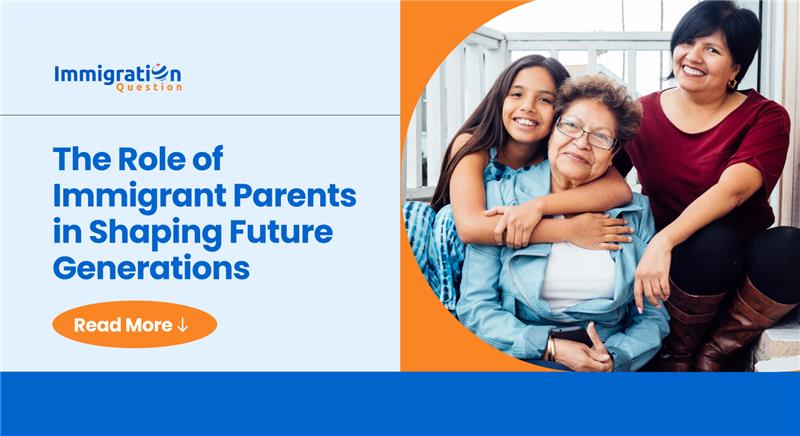The Role of Immigrant Parents in Shaping Future Generations
The United States has witnessed a significant rise in immigration in recent decades. Most immigrants are from developing countries such as Mexico, China, Cuba, India, etc. Today, approximately 14% of the U.S. population consists of immigrants, with immigrant children comprising nearly 25% of all American youth. This shift in demographics has changed the cultural makeup of the nation and highlights the vital role immigrant parents play in shaping the next generation.
For immigrant parents, education is a collective victory for the entire family. These parents often see their children’s academic success as an opportunity for socioeconomic mobility and a way to overcome the financial and cultural challenges of being in a new country.
This article delves into the parenting challenges immigrant parents face, their aspirations for their children’s education, and the impact of family engagement in shaping future generations.
Parenting Challenges in a New Country
Immigrant families face numerous challenges after arriving in a new country. These challenges include acculturation, role reorganization, and, sometimes, financial strain. Navigating these parenting challenges while building an ideal family environment for children is no small feat. Parents are tasked with finding a balance between integrating into the host society and preserving their cultural values.
These responsibilities can be overwhelming, particularly when language barriers, unfamiliar school systems, and economic pressures come into play. These barriers often hinder immigrant parents from active school involvement in their children’s lives. A result of these struggles is a lack of educational support and poor family engagement.
Many immigrant parents may feel unwelcome in school settings or struggle to understand academic expectations. However, this does not diminish their aspirations for their children. Research shows that immigrant parents have high expectations for their children’s educational success. These parents view education as a pathway to a better future and a way to build resilience. Many immigrant families see investment in their children’s education as a priority.
Parenting Styles in Immigrant Families
Parenting styles among immigrant families vary significantly and can greatly influence children’s educational outcomes. Research shows that the recognized parenting styles are authoritative, authoritarian, indulgent, and neglectful. Each style plays a role in shaping a child’s life trajectory, especially academic-wise.
Authoritative parenting is characterized by warmth and high expectations and has been linked to better academic outcomes. Immigrant parents who embrace this style provide solid educational support and encourage autonomy in learning.
Authoritarian parenting is where strict demands overshadow warmth. This style can hinder academic success due to the stress it places on children. An authoritarian parenting style is often culturally specific; for example, in Chinese American households, a “tiger mom” approach may prioritize academic success but may overlook social and emotional development.
Research indicates that while certain culturally adapted authoritarian practices, such as tiger parenting, may appear effective, they do not always lead to optimal academic attainment.
In immigrant families, the father’s school involvement plays a significant role in a child’s educational aspirations. These outcomes differ between kids: thorough involvement helps children, especially daughters, prepare for post-secondary education and strengthens family bonds.
Through these varied parenting styles, immigrant parents adapt to the host society, preserve their cultural identity, and shape their children’s academic journey.
Parental Aspirations and School Involvement
Immigrant parents’ aspirations are essential in guiding their children’s academic goals and persistence. Studies indicate that children’s academic success is significantly linked to their parents’ educational expectations. In many immigrant families, children’s accomplishments, including academic achievement, reflect the entire family’s resilience and adaptability.
School involvement can take many forms, from academic socialization to discussions about the future. However, poverty and economic instability can limit immigrant parents from being engaged in their children’s education. Financial challenges are common among immigrant families, and they often lead to reduced involvement in school activities.
Minimal school involvement by parents can adversely affect children’s academic performance. However, studies show that despite limited resources, many immigrant parents strive to support their children’s education by reinforcing the importance of hard work and dedication.
Children in higher socioeconomic immigrant families may attend supplementary programs like Montessori, Kumon, or language schools to enhance their skills. This added workload, while demanding, contributes to academic versatility and reinforces parents’ aspirations for their children’s future success.
Barriers to School Involvement – Immigrant Parents for Future Generations
One of the major challenges immigrant parents face regarding school involvement is the feeling of being unwelcome or intimidated by school settings.
Schools that actively encourage immigrant parent participation and provide language support can offer solutions. Efforts to increase family engagement within schools might include offering multilingual resources, educating parents about the American school system, and creating welcoming spaces for parents to connect.
These steps will empower parents to support their children’s academic journey and transform the school experience into one of collaboration rather than separation.
Preserving Cultural Heritage – Immigrant Parents for Future Generations
Immigrant parents not only aim to support their children’s academic growth but also seek to preserve their cultural heritage. Many families make it a priority to maintain their native language and pass cultural values down to future generations. Native languages allow children to communicate with extended family members in their home country, strengthening family ties.
This dual-language development helps create a sense of identity and can help children better manage the struggles of growing up between two cultures.
Predictions regarding Immigrant Parents for Future Generations
As generations come and go, the emphasis on academic excellence among immigrant families may shift, yet the foundational values will likely remain intact. First-generation immigrant parents are focused on their children’s education, to secure a brighter future in the U.S. Over time, as families acculturate, the strong drive for academic success may diversify, with successive generations pursuing various pathways to success.
However, research indicates that certain immigrant groups, such as Chinese and Mexican American youth, continue to uphold educational aspirations across generations. These societies have held academic achievement as a core family value.
The generational continuity of these values also reflects the importance of being bicultural. Second-generation youth who can understand American and their native cultures tend to achieve higher levels of education. This generation of immigrants has developed a deep-rooted respect for family values and an understanding of the host society’s expectations. This bicultural adaptation promotes a lifelong appreciation for education.
The role of immigrant parents in shaping the next generation is indispensable. These parents bring rich cultural traditions, high educational aspirations, and diverse parenting styles, all of which contribute to their children’s success. Immigrant parents are shaping a brighter future for their children and the country through a commitment to education and family.
By overcoming parenting challenges, increasing school involvement, and providing educational support that bridges two cultures, immigrant parents are paving the way for future generations to thrive. The U.S., as a nation built on diversity, must recognize and support these efforts by creating an inclusive environment for both parents and children.
About Immigration Question – Immigrant Parents for Future Generations
ImmigrationQuestion.com is a revolutionary platform that connects immigration attorneys to people who have immigration-related enquiries. We provide guidance on U.S. visas, citizenship, and green cards, keep you informed with the latest immigration news, and foster a knowledgeable community for support and insights.









